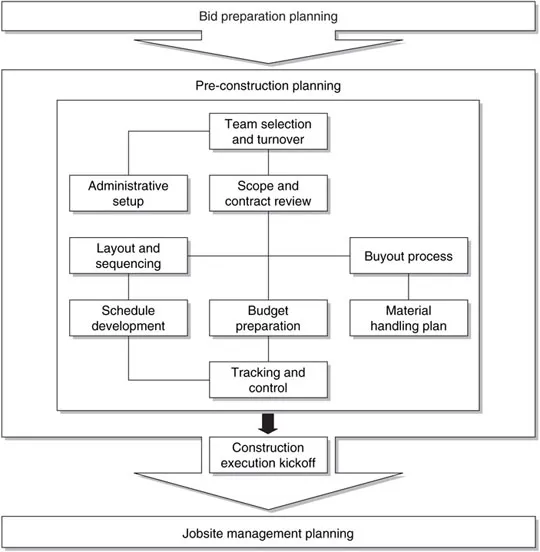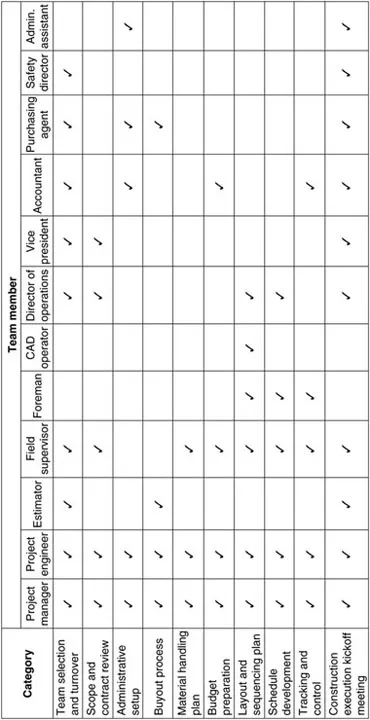
Construction Project Management
A Practical Guide for Building and Electrical Contractors
Eddy Rojas
- 432 Seiten
- English
- ePUB (handyfreundlich)
- Über iOS und Android verfügbar
Construction Project Management
A Practical Guide for Building and Electrical Contractors
Eddy Rojas
Über dieses Buch
Construction Project Managemen t offers some of the best project management studies commissioned by ELECTRI International: The Foundation for Electrical Construction that were selected, coordinated, and monitored by some of the most progressive contractors and performed by outstanding scholars from top U.S. universities. Topics include pre-construction planning, early warning signs of project distress, impact of change orders, project sequencing, ideal jobsite inventory levels, tool and material control systems, recommended safety practices, partnering, total quality management, quality assurance, performance evaluations, and contract risk management. All specialty and general contractors will find value in this practical book. The concepts presented will improve your understanding of the main issues affecting construction project management and will provide you with tools and strategies to enhance your company's productivity and profitability.WAV offers downloadable files consisting of:
- Checklists for each one of the 10 categories that make up the model pre-construction planning process, including standard procedures for change orders, RFIs, submittals, transmittals, billing, progress updates, a sample requirements and expectations letter and a sample letter of intent.
- A Spanish translation of Chapter 7: Recommended Safety Practices.
- A methodology for assessing contractors' TQM program progress based on the Malcolm Baldrige National Quality Award Criteria.
- Materials to assist contractors in preparing a quality assurance manual and implementing an effective quality assurance program.
- A template for a partnering workshop that includes a sample partnering agenda, an introduction to the basic partnering concepts, sample mission statements, and a sample partnering charter.
- Sample evaluation forms that contractors can customize to evaluate supervisors, journeymen, and apprentices.
Häufig gestellte Fragen
Information

INTRODUCTION
METHODOLOGY
- Projects that experience an appropriate planning effort also experience more successful outcomes.
- There are significant pre-construction planning activities that distinguish a successful project from a less-than-successful project.
PRE-CONSTRUCTION PLANNING PROCESS
- Top managers must reinforce their commitment to a standardized planning process and must ensure planning is performed on every project.
- The model planning process must be tailored to each project based on its particular characteristics. For example, a small project might require only a few minutes on some of the activities, whereas a large project might require several hours or days on those same activities.
- A system for tracking the success on projects that are well planned and that followed the model planning process will serve to document its benefits.
- In addition to implementing a model planning process, consider implementing a “double-check” system in which the supervisor double-checks the planning performed by the project manager. This should ensure planning is performed consistently across the company.
- The early involvement of the field supervisor in the planning process has been shown to improve the chances for a successful project. Therefore, consider selecting and involving your field supervisor during the bidding stage or in the early part of the post-award stage.
- Ensure that excellent planning effort is applied to those activities that are identified as critical. These are the activities that have the greatest potential for impacting the outcome of the project.
- The planning kickoff meeting alerts all involved team members that the planning process is officially underway, and it allows the project manager to establish deadlines for completion of activities. Likewise, the construction execution kickoff meeting brings the team members back together to review the progress of the planning and ensures that all tasks have been, or will be, completed by the deadline. These two meetings should be held on all projects regardless of size. Lessons learned and a feedback loop should be an essential part of your standardized planning process. Project managers and field supervisors should share planning practices.

Figure 1.1 Overview of the model pre-construction planning process

Figure 1.2 Team member involvement in pre-construction planning
- The project was profitable
- The customer was satisfied
- The project resulted in repeat business
- The project resulted in good working relationships between the trade contractor, the general contractor, and the owner
- The worksite was safe and there were no accidents
- The project was completed on time
- The workers took pride in the completed project
- There was effective communication and cooperation between the trade contractor, the general contractor, and the owner
- The quality of the work was excellent
- The project achieved its budg...